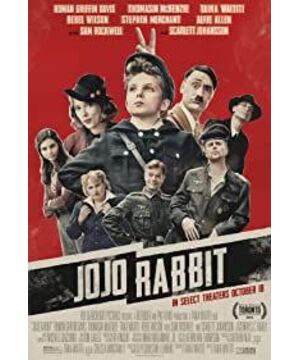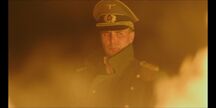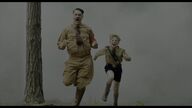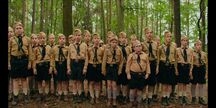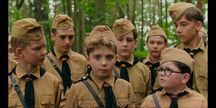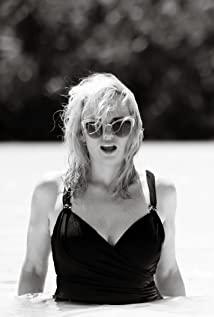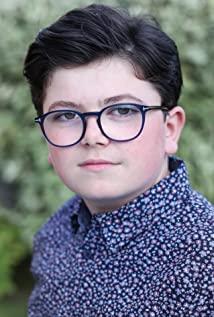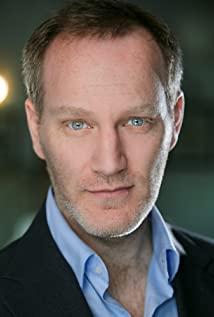"Jojo Rabbit" is a war movie from a children's perspective, or it can also be seen as a coming-of-age movie in the context of war. The extremely saturated colors and regular composition made me think at first that the director was Wes Anderson, like the twin of "Moonrise Kingdom" and "The Grand Budapest Hotel". For movies that deal with war themes from the perspective of children and individual trauma, there are already excellent works such as "Life is Beautiful", "The Boy in the Striped Pajamas" and "Sophie's Choice". Unlike the previous films, this film uses the brutal war situation as a backdrop as a distant background, which is weakened in the plot, in other words, we do not see war in this film for the characters A clear imprint on his body. In "Life is Beautiful", we see the protagonist Guido and his son playing games in a concentration camp. We can see that Guido is deliberately relaxed, but we know that his heart is desperate. From the perspective of bystanders, he is Hysterical, divisive. In "Sophie's Choice", Sophie, as a mother who was forced to choose one of her own flesh and blood in a concentration camp to die, even if she had escaped, she still could not bear the great pain brought to her mental torture, so she is neurotic and extremely vulnerable. In this film, the director seems to deliberately maintain a level-headed perspective with children from beginning to end to shoot and design, all cruel reality is hidden, we can see its clothes - in Jojo's Scarlett Johansson The only time the mother pretended to be Jojo's father was angry at him for getting out of control, when she ended up being martyred in the square. However, as soon as it gets closer, the director moves the camera away again, as if refusing to give it a kind of soulful stare or deep reflection.
In the film, a German city far away from the center of the war and the children of Jojo and his friend Yuke, who are also in the ideological "nerve endings", are used to express Germany as the overall symbol of the "persecutor" in World War II. divisions within the nation. In addition to the confused children, there are also German officers who are confused all day long, and the underground party represented by Jojo's mother who opposes the Nazis. These roles and intentions are all trying to show that the German nation is not monolithic, and the people at the bottom are not yet. When you understand what happened, you have become a historical sinner. At the end of the film, as soon as the Allied troops entered the city, they began to swarm all the Germans, regardless of whether it was good or bad. An irony of stereotypes. In stark contrast (from the standpoint of ordinary Germans) is the film's thin and pale portrayal of the Jewish people and the easily arranged reconciliation. In the film, as the representative of the Jewish people, Aisha, a Jewish girl who hid in Jojo's house until the end of the war and survived fortunately, her image in the film is like a elf, constantly guiding the whole Jewish people who have not seen any Jew. Jojo, who is full of imaginary hatred in the nation, turned his prejudice, suspicion and hatred of the entire Jewish nation into understanding, trust and admiration for a Jewish girl. At the end of the film, the Jewish girl, after being deceived by Jojo about the outcome of the war for a while, turns to forgive him easily—you know, her family, her fiancé, have all died at the hands of the Nazis. At the end of the film, she even replaces Jojo's dead mother, and like her sister and mother, she continues to live with Jojo - they even dance on the street right away.
Jojo's growth has coincided with his mutual acceptance of Jewish girls. This reconciliation was too easy, but also too unique and individual, making me feel a subtle discomfort throughout the viewing process. It is true that as long as the war begins, it is a disaster for mankind. The perpetrator and the victim are just two names. It is the creatures who suffer in the war, especially children like Jojo, whose father and mother are both. Devoured by this war, along with his normal childhood. But, as his friend Yuke said: "I never seem to die!" This kind of film seems to be able to lift weight, as if it has opened up an alternative form of presentation under the old war movie, but it is actually very easy to sword. Going sideways is a big test for the director. Catastrophes that have actually happened in human history such as World War I and World War II are like a sword of Damocles. While providing huge historical and artistic resources, they also constantly test people's value stance. Adorno once eloquently reminded people - "After Auschwitz, writing poetry is barbaric" - always think from the point of view of the weak, and this principle cannot be overstepped. The tension between the seriousness of the anti-war theme and the poetic expression of the film determines the difficulty of such a theme.
As a war movie, it's fresh and gimmicky (including a setting for his imaginary friend Hitler), but not deep enough. As a growing-up movie, it seems wasteful and cannot clearly distinguish the growth of children in the context of war from the growth of ordinary children. The plot can be carefully designed, but if the director's value orientation has some subtle deviations, it will make the audience feel uneasy. After the movie, Jojo's life has just begun, and we can imagine that the war will be like the sequelae of a serious illness, leaving a mark on all aspects of his life. As if to give Jojo and the audience some relief, at the end of the movie, the director sent us a poem by Rilke. This verse reignited my discomfort with my stance on the film, as well as recalling Adorno's warning. The poem that was originally intended as a word of consolation, I also transcribe here as a reminder:
Let everythinghappen to you
Beauty and terror
Just keep going
No feeling is final
-Rainer Maria Rilke
View more about Jojo Rabbit reviews


